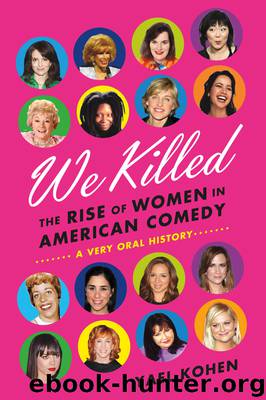We Killed by Yael Kohen

Author:Yael Kohen
Language: eng
Format: epub
Publisher: Farrar, Straus and Giroux
6
The Boom Years
While the first wave of stand-ups started hitting the comedy clubs in the 1970s, it wasn’t until the 1980s that any began to emerge as bona fide stars. Even then, stand-up remained a boys’ club, but the rapid expansion of comedy venues hungry for talent, cable television outlets hungry for easy-to-produce programming, and network executives hungry for stand-ups with sitcom potential created an unprecedented opportunity for women. It wasn’t without qualification. On the one hand, never had there been such a variety of female voices in stand-up. But on the other, the most successful female comics tended to be tough, husky, or androgynous, as clear a signal as any that the Diller-era ethos had yet to disappear. Part of the brashness of the women was a response to the rough-and-tumble atmosphere of the comedy clubs. Part of the asexuality was likely a result of the 1980s Dress for Success spirit that favored women in men’s clothing. But there is also a deeper, more culturally ingrained explanation: joke-telling—the art of punching out hard, aggressive quips and one-liners—is, as they say, “doing comedy like a guy.” In other words, it isn’t feminine. The bias against “women’s humor”—humor about relationships or body issues—would hang like a cloud over women comics throughout the decade.
SUSIE ESSMAN, comedian Comedy was the rock and roll of the eighties. I mean, every weekend, lines around the corner to get in for every show. You could feel it. It was a hot, hot, hot place to be.
RITA RUDNER, comedian It was a boom of comedians—we didn’t know why, we just wanted to do it. It wasn’t because you were going to get fantastically wealthy. We just all loved comedy.
ROSEANNE, comedian It was very loose; fun, actually. It was just so exciting as a comic to see other comics get up there and push it as far as they could push it. We loved pushing the boundaries, and seeing each other push them, too, and just having a blast before it got so corporate and Dane Cook–ized.
MARK LONOW The clubs started to open big-time after we went on the air with An Evening at the Improv. After that, every guy who had a room was like, “It’s no expense, all you need is a microphone and a stool, and you’re in business.” [In the beginning] none of the comics got paid. Within five years, hundreds and hundreds of clubs opened.
RITA RUDNER The boom was also the result of cable TV coming into being at the same time. Cable didn’t have any money, so if they put a microphone in front of a wall and hired someone that they didn’t have to pay any money to, they had very cheap television.
JOY BEHAR, comedian There was a period in the late eighties when HBO was giving a lot of specials to people and the women were among them. In fact, there was one show called Women of the Night. Susie Essman and I were in that; Diane Ford and Lizz Winstead and some other people were too.
Download
This site does not store any files on its server. We only index and link to content provided by other sites. Please contact the content providers to delete copyright contents if any and email us, we'll remove relevant links or contents immediately.
Spell It Out by David Crystal(36117)
Professional Troublemaker by Luvvie Ajayi Jones(29663)
The Secret History by Donna Tartt(19092)
We're Going to Need More Wine by Gabrielle Union(19046)
Cat's cradle by Kurt Vonnegut(15357)
The Goal (Off-Campus #4) by Elle Kennedy(13674)
The Social Justice Warrior Handbook by Lisa De Pasquale(12190)
The Break by Marian Keyes(9368)
Crazy Rich Asians by Kevin Kwan(9292)
The remains of the day by Kazuo Ishiguro(9000)
Thirteen Reasons Why by Jay Asher(8912)
Educated by Tara Westover(8054)
The handmaid's tale by Margaret Atwood(7767)
Giovanni's Room by James Baldwin(7346)
Win Bigly by Scott Adams(7199)
This Is How You Lose Her by Junot Diaz(6887)
The Rosie Project by Graeme Simsion(6415)
Six Wakes by Mur Lafferty(6259)
The Power of Now: A Guide to Spiritual Enlightenment by Eckhart Tolle(5783)
